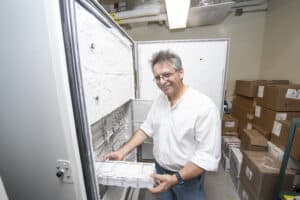Three New Phages Developed for Nontuberculosis Mycobacteria in People with CF

Graham F. Hatfull, PhD
University of Pittsburgh
Pulmonary bacterial infections, specifically drug-resistant infections, drive disease progression and mortality in people with cystic fibrosis (CF). Among the worst are non-tuberculosis mycobacterium (NTM) infections, which are often resistant to available antibiotics and can disqualify individuals from lung transplantation at many transplant centers. In addition, these infections can be particularly dire in people with CF that are post-transplant and taking immunosuppressive drugs. More approaches are urgently needed to help people with CF combat these infections.
At Emily’s Entourage (EE), we are working tirelessly to support the development of new treatments to fight drug-resistant infections, and we are so excited to share that EE grant recipient, Graham F. Hatfull, PhD, and his team from the University of Pittsburgh, have isolated bacteriophages, also known as phages, for compassionate use through a special request from the FDA in the treatment of NTM infections in people with CF who have exhausted other treatment options.
In 2022, EE awarded grant funding to Dr. Hatfull and his team to focus on identifying, preparing, and providing phages for compassionate use in the treatment of NTM infections in people with CF. The knowledge gained from this project will subsequently be used to optimize phage screening, preparation, and stability.

Phages are viruses that attack and kill their bacterial hosts. They have a strong safety profile and can be used in conjunction with antibiotics. Phages are found in the environment, often in the dirtiest places, including sewage water, gym floor drains, swamps, and more. One of the challenges of phage therapy is its personalized approach. The phage has to be identified and prepared to treat each person’s specific infection, which makes scaling phage therapy more challenging.
Although phage therapy is not a licensed treatment in the United States, in certain cases, individuals with CF who have serious multidrug-resistant bacterial infections that are not responding to antibiotics may be eligible for phage therapy through a special request from the FDA’s Emergency or Single Patient Expanded Access Investigational New Drug (IND) procedure (also known as “compassionate use”).

To date, EE has funded the development of 11 other phages for the treatment of methicillin-resistant Staphylococcus aureus (MRSA) by Dr. David Pride, MD, PhD and his team at the Center for Innovative Phage Applications and Therapeutics Lab at UC San Diego School of Medicine and by Drs. Ben Chan, Jon Koff, and Paul Turner at Yale University.
Interested in learning more about what it is like to undergo phage therapy? Read Ella Balasa’s story of being treated with phage therapy as she dealt with an intractable infection and ran out of other treatment options.
Dr. Hatfull and his team’s work is incredibly exciting, and a pivotal step in evaluating the safety and efficacy of phage as an additional therapy for CF. In addition, this achievement represents a significant milestone in EE’s ability to bring potentially lifesaving treatments that address major unmet needs in the CF community to people with CF who need them the most.

Dr. Hatfull and his team are not currently able to respond to inquiries by individual people with CF. If interested, please discuss with your physician and have them reach out to the Hatfull Lab via their website or email gfh@pitt.edu.
